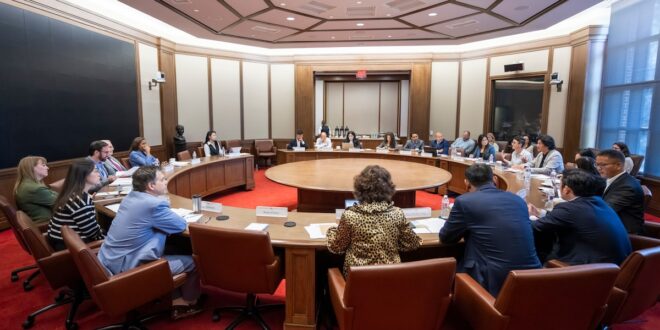🔥 Trending now in : At Bush Institute, advocates strategize in the global fight for freedom

Michael Hogue
Rushan Abbas’ big sister, Gulshan, has always been her protector.
“As a medical doctor, she spent all her life taking care of people. She is the kindest and most caring person I have ever known,” Abbas remembered Monday afternoon, tears starting to soften her eyes. “After my mother passed away 21 years ago, she was like a mother figure to me.”
Gulshan means flower garden, and under her protection, Rushan flourished in Xinjiang, the region in Northwest China now hosting a sweeping and systematic oppression some human rights advocates are calling genocide.
After Rushan moved to the U.S., Gulshan came to visit her and their brothers and their families in 2016. The siblings had begged Gulshan not to go back to China. It’s not safe for their people, the Uyghurs, they insisted.
But Gulshan felt a pull back to their homeland. Ever the one to watch over others, she said someone from the family needed to be there to visit the graves of their parents, Rushan remembered. Besides, Gulshan was not a political actor — not a threat to the Chinese Communist Party. “I’m just an ordinary person,” she told her sister. “If something happens to me, it means nobody in China is safe.”
In 2017, after the CCP started rounding up Uyghurs and putting them in detention camps, Rushan spoke out publicly against the campaign. Knowing that would make her and her family targets of retaliation, Rushan said she didn’t speak with her sister for a year, keeping her distance to return the protection Gulshan had always provided her.
“The last time I talked to her on the phone … the last words she said to me was, ‘Get enough sleep. Don’t forget to take care of your health.’” The protector still.
But in the end, Rushan said, her voice cracking, “I couldn’t protect her.”
Today is the seventh anniversary of Gulshan’s arrest and disappearance.
Dallas
Rushan Abbas is now a leading voice for Uyghur rights, the founder and executive director of the nonprofit Campaign for Uyghurs. She was one of 13 freedom advocates in Dallas this week taking part in the first ever Asian Democracy Leaders Roundtable at the George W. Bush Institute at SMU. The advocates, all now living in the U.S., come from Myanmar, China, Taiwan, Hong Kong, North Korea, Tibet and Afghanistan.
Bush Institute organizers, including North Korean Joseph Kim, himself an escapee from an oppressive regime, said freedom fighters need to collaborate because dictators do. Governments in China, Russia, North Korea and elsewhere share information, resources, even troops.

Joseph Kim, program manager, global policy at the George W. Bush Institute, speaks during the organization’s first ever Asian Democracy Leaders Roundtable.
Grant Miller Photography / Courtesy of the George W. Bush P
Totalitarian regimes prey on the weak and marginalized. China is a good example. There are fewer than 12 million Uyghurs living in China, making them less than 1% of that country’s population. And the government has spent decades systematically pushing them to the margins. It’s difficult to imagine Uyghurs mounting a popular uprising of any kind.
“There’s not much anybody can do for the Uyghur people,” Abbas said, pensively. But if a threat to freedom anywhere is a threat to freedom everywhere, then freedom advocates should support each other, even as they fight in different contexts.
“Silence is the oxygen of tyranny,” Abbas said.
Afghanistan
For Afghan gender equity activist Metra Mehran, the front lines of freedom look much different, and more closely tied to American involvement. Afghan women have recent memories of life without the Taliban.
“They have been to school. They have been to university,” Mehran said. “They have been exposed to a lot. They have their dignity. They have an income. They’re independent. They have access to hospital.” And now, with all that gone, “They have been resisting. They resisted in the streets.”
A nonprofit called the Afghanistan Justice Archive publishes every Taliban order that has reshaped the country, and the lives of its female citizens, since the U.S. withdrew in 2021. There are hundreds. Many women are no longer allowed to attend school, to speak in public, to drive, to access health care.
“Womanhood in Afghanistan is a crime,” Mehran said. “My voice is a crime. If I speak loud. If anyone in public hears me … How I dress … My freedom of movement is restricted … I cannot do anything … I am the child bearer, the cook inside the house, I’m nothing else. So my whole presence in life as a woman is a crime.”
Mehran said one of the most insidious Taliban tactics is to punish men and boys when women in their families break these rules. She called it social engineering.

Afghan gender equity activist Metra Mehran said progress is being made for women and girls because they’ve experienced what life is like without Taliban oppression.
Grant Miller Photography / Courtesy of the George W. Bush P
Mehran, a policy adviser for the Strategic Litigation Project at the Atlantic Council, sees the treatment of women as an indicator of the health of a society. She said the subjugation of women makes a society sick in such a way that it invites other sicknesses.
“The society malfunctions because you are totally erasing half of the population,” she said. “That society is malfunctioning in a way that cannot fathom democracy, that cannot fathom freedom, that cannot fathom economic prosperity … that will be a safe haven for terrorist ideologies.”
Despite that, Afghan women are making progress. In July, the International Criminal Court issued arrest warrants for the Taliban’s supreme leader and chief justice for their actions against women and girls, which constitute international crimes, the court said. In Washington, Congress is considering another extension of the Afghan Adjustment Act, which creates a pathway to permanent residency for Afghans who came to America after assisting the U.S. mission and evacuation in their homeland. And the End Gender Apartheid campaign is making progress convincing U.N. member states to codify gender apartheid as a crime against humanity.
China
It takes no new legislation to identify crimes against humanity happening in Xinjiang. Despite the CCP’s secrecy, details of the atrocities there have been leaking out. Multiple news and human rights agencies have estimated that more than 1 million Uyghurs have been held there in concentration camps, which the CCP refers to as re-education camps.
Uyghur women are subjected to forced sterilization and forced abortions, reports say. “Uyghur women’s bodies are the battleground of this genocide,” Abbas said.

Rushan Abbas, founder and executive director of the nonprofit Campaign for Uyghurs, motions during the Asian Democracy Leaders Roundtable at the George W. Bush Institute. Abbas’ sister has been held by the Chinese Communist Party since 2018.
Grant Miller Photography / Courtesy of the George W. Bush P
In 2020, U.S. Customs and Border Protection intercepted a shipment of 13 tons of hair products from Xinjiang — wigs, extensions and the like — made with human hair.
Most chilling of all, Radio Free Asia reported that the Chinese government is building crematoria, or what bid documents call “burial management centers,” near the Uyghur internment camps.
If you’re giving the CCP the benefit of the doubt (which you shouldn’t) and those facilities don’t portend death on a massive scale, they certainly symbolize culturicide. Uyghurs are primarily Muslim; they don’t practice cremation. Abbas told of Uyghurs being forced to video themselves eating in sunlight during Ramadan. Anything to strip them of their ethnic and religious identity.
Writing for the Hoover Institution in 2018, U.S. Naval Academy professor Miles M. Yu described China’s efforts in Xinjiang as the CCP’s “final solution” for the Uyghurs.
“The rush for the construction of a large number of ‘re-education’ concentration camps for the Uyghur masses, the systematic round-up and arrests of Uyghur intellectuals on college campuses and school yards, detentions and arrests of lawyers, businessmen, and other Uyghur elites, the ominous surge in the number of new crematoria in Xinjiang — all sound the alarm of another genocide or even holocaust in the making,” Yu wrote.
North Korea
Kim, the North Korean escapee, is now a program manager for global policy at the Bush Institute. His story, captured in his book Under The Same Sky: From Starvation in North Korea to Salvation in America, is harrowing in the extreme. After watching his father starve to death at the age of 13, Kim was left to live on the street, alone. He sneaked across the border into China where he connected with an underground church and eventually escaped to America.
“Hope kept me alive,” Kim said in a 2013 TED Talk. “Hope brought me to America.”
Kim said he hopes roundtable participants will take inspiration from other improbable stories: the 2004 Boston Red Sox, the election of President Barack Obama, the migration of Monarch butterflies — four-inch long insects that travel 2,000 miles from Mexico to Canada, a trip that takes three generations.
“What kind of courage and humility does it take for the first generation to embark on a journey they know they may not be able to complete?” Kim asked.
It’s doubtful that the butterflies “know” anything at all. They’re just doing what their instincts tell them. But maybe that makes the metaphor even more appropriate. There’s a deep and primal urge for freedom in the human heart. Kim is following it, even if he doesn’t get to see it through.
“I have to choose to believe that it is a solvable problem,” Kim said. And that he might get “to go back to North Korea one day and see a free North Korea where every man, woman and child has a chance to decide their own identity and their own future, not dictated by the government. That’s what’s keeping me going.”
Small world
The nations represented at the Bush Institute roundtable are not the only places in the world where freedom is threatened, nor even the only places in Asia. The list of totalitarian states and floundering democracies is long and growing. In 2022, the democracy watchdog Freedom House issued a report that detailed 16 consecutive years of democratic decline around the world. Only about 20% of the world’s population lives in countries considered free, the report found. In 2023, the University of Birmingham predicted that less than 5% of the world will live in full democracies by 2026.
In a world like that, we should all pay attention to voices like those who gathered in Dallas this week — a week that includes the 24th anniversary of our history’s most violent attack incubated by an unstable foreign regime.
“Remember what happened on 9/11,” Mehran said at the Bush Institute. “The U.S. is very far from Afghanistan, but it was not that far.”
We welcome your thoughts in a letter to the editor. See the guidelines and submit your letter here.
If you have problems with the form, you can submit via email at letters@dallasnews.com
Source link
 Deep Insight Think Deeper. See Clearer
Deep Insight Think Deeper. See Clearer


